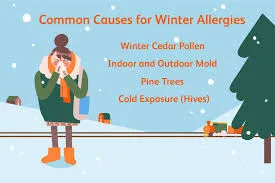For many, the arrival of spring brings with it the promise of blossoming flowers, chirping birds, and, regrettably, allergy season. That being said, specialists caution that allergy patients may have an especially difficult year. Local allergists speculate that increased pollen generation and more severe allergy symptoms may result from the mild winters saw in many areas.
A pattern in his patients’ conditions has already been noticed by Dr. Asif Khan of the Asthma & Allergy Center. In comparison to other years, he notes that many people are reporting worse allergy problems. This anomaly can be explained by the absence of a severe winter. Frost and low temperatures usually suppress plant growth, delaying pollen production until spring. But because of earlier pollen production by plants brought on by milder winter weather, the allergy season is longer and more severe.
This is more than simply hearsay. Weather patterns and allergy intensity are related, according to research. Warmer winter temperatures are linked to higher pollen generation in trees like birch and oak, according to a study published in the journal Allergy. Furthermore, in people who are already sensitive, an extended pollen season may make symptoms worse.
Not simply the temperature is to blame. Allergies can be made worse by damp weather, which are also common this winter in some places. Because it grows well in damp conditions, mold spores can cause allergy symptoms including sneezing, runny nose, and itchy eyes, just like pollen does.
Allergies are becoming more common as a result of climate change. In response to rising global temperatures, plants are blossoming sooner and producing more pollen, according to a report published by the National Center for Biotechnology Information [NCBI]. According to the paper, these alterations could also result in the creation of new allergens or a rise in the potency of already-existing ones.
This news can be scary for those who suffer from allergies. Nonetheless, there are actions you may take to control your symptoms and lessen the effects of the season. The following advice is provided:
- Consult an allergist: Speaking with an allergist can assist in determining your unique triggers and creating a customized treatment strategy. Immunotherapy, or allergy shots, or a combination of the two, may be used in this context.
- Keep yourself updated: To find out when the pollen count peaks, frequently check the forecasts for pollen. Pollen forecasts are available on the internet and in weather applications.
- Cut down on exposure: When pollen counts are high, try to avoid going outside in the early morning and late afternoon when the concentrations of pollen are usually at their peak. Keep windows closed and use a HEPA-filtered air conditioner to further minimize the penetration of pollen.
- Shower and change clothes: To get rid of any pollen stuck to your hair and clothing after spending time outside, shower and change clothes as soon as you get inside.
- Regularly wash bedding: On bedding, pollen can gather. Once a week, wash your linens and pillows in hot water (at least 130°F/54°C) to get rid of allergies.
- Think of using a nasal spray: By clearing your nasal passageways of pollen and other allergens, using a saline nasal rinse can help relieve congestion and irritation.
Allergy sufferers can minimize the effects of allergy season while still enjoying the beauty of spring by adopting these preventative measures. See your physician or allergist for additional advice if you have severe symptoms that are unresponsive to over-the-counter drugs.







